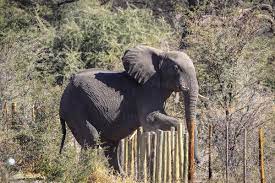Chief Nyangazonke Ndiweni of Matobo says traditional leaders are not involved in efforts to curb wildlife-human conflicts.
Human and wildlife conflict refers to any human and wildlife interaction which results in negative effects on human, social, economic or cultural life, on wildlife conservation or on the environment.
The traditional leader said there is a need for a proper reporting structure that involves them so they assist in cases where humans fall victim to wild animals.
“What we need to understand is the reporting structure, in as much as people will report to the police and parks authorities but my take is let us include traditional leaders in such issues. I was last engaged in a meeting by National Parks 4-5 years back, of which it’s a long time,” said Chief Nyangazonke.
“The police are okay as they are employed by the government, but these are people deployed in our areas. Even the parks representatives are officials deployed to our area, but we are saying there should be traditional leaders involved.”
He said there is a need for a coordinated approach in finding ways to deal with the growing problem.
“If traditional leaders are involved in wildlife meetings, it could be authorities from the parks, police or health sector holding such meetings, it makes it easier for us as traditional leaders to make follow-ups,” he said.
“As it is there is a child who was killed by a crocodile in Nathisa, if police solve those issues alone without involving us as the traditional leader who is staying with people in these communities it becomes unfair because we as Chiefs we make follow-ups far much better in the family.”
Chief Nyangazonke added that they can also be able to raise these issues in other forums which they attend as traditional leaders.
“This year we received heavy rains, animals can inhabit different streams, but we don’t know whether these animals were captured and taken to the parks or we have created an environment for them. We have children who will play in such streams who can be exposed to such danger, so we want to be involved in these meetings so that we can highlight such issues but when they do it alone there is no information sharing,” he said.
“At the moment there is no coexistence between National Parks authorities and traditional leaders, if those authorities are deployed in other areas as communities, we then remain with the same problems because there is no information sharing. As traditional leaders, we also have a role to advise communities on issues such as poaching, wildlife management so we need that information.”
Meanwhile, Chief Nyangazonke also called for the employment of locals at local national parks instead of importing labour.

